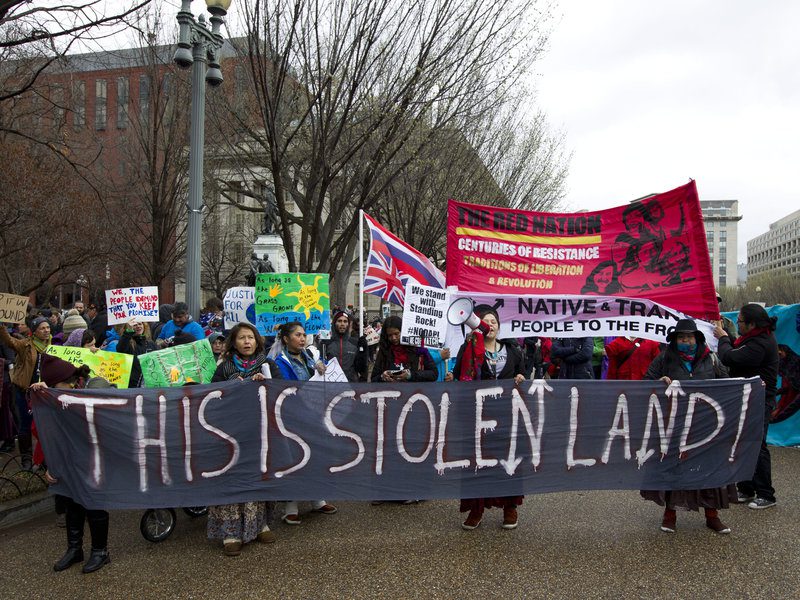
Inspired by the indigenous-led Black Hills #Landback demonstration earlier this summer, the Great Plains Action Society and other non-profits began circulating an “Eviction Notice” to the Dakota Access Pipeline, as well as the Keystone XL Pipeline.
They threatened to make good on an article of the Ft. Laramie Treaty of 1868 directed at “bad men among the whites,” carrying on the international grassroots struggle in support of tribal governments’ opposition to oil pipelines, which brought thousands of self-proclaimed water protectors to face-off with pipeline builders at Standing Rock in 2016-2017.
The movement gained steam as a three-judge panel in Washington ruled on Aug. 5 to let stand a lower court’s order for withdrawal of DAPL’s federal permit to cross the Missouri River just upstream from the Standing Rock Sioux Tribe’s drinking water intake.
The order for withdrawal had come in March, when a district judge revoked the permit issued to pipeline builder Energy Transfer Partners and associates four years ago by the U.S. Army Corps of Engineers because it violated the National Environmental Policy Act by failing to carefully consider the dangers posed to the Standing Rock Sioux Tribe.
In July, he ordered the oil flow shut off by Aug. 5 and the pipeline closure until the Corps conducted the multi-year environmental impact statement that the Standing Rock, Cheyenne River, Yankton and Oglala Sioux tribal governments have sued to attain.
In the latest ruling, the panel seated at the U.S. District of Columbia Circuit Court of Appeals acted on an appeal from the Corps of Engineers and the pipeline operators. The panel stayed the shutoff notice on the same day it was to go into effect, but it urged parties in the case to file all briefs in the appeal of the permit revocation by the end of September.
Standing Rock Sioux Tribal Chair Mike Faith hailed the decision as a milestone on tribes’ long crusade against the pipeline route through unceded treaty territory. “As the environmental review process gets underway in the months ahead, we look forward to showing why the Dakota Access Pipeline is too dangerous to operate,” he said.
Meanwhile it falls to the Army Corps of Engineers, which issued the now-invalid permit, to decide whether to exercise its authority to shut down the pipeline. The issue will go back to the lower court for more proceedings on that count if the Corps doesn’t, but U.S. President Donald Trump, a former shareholder in the pipeline company, has ordered the agency to do everything in its power to facilitate the pipeline.
Earthjustice attorney Jan Hasselman, one of many lawyers for the tribes in the pipeline battle, explained, “The pipeline is now operating illegally.” But, he said, “We are confident that it will be shut down eventually.”
He called the pipeline “an affront to tribal sovereignty and a threat to public health and clean water,” adding, “Everyone would be safer if operations were halted.”
Faith added, “We’ve been in this legal battle for four years, and we aren’t giving up this fight.”

When tribes and allies came together in 2016 to halt pipeline construction, the DAPL conflict “sparked an ongoing conversation about indigenous rights and the federal government’s longstanding pattern of steamrolling ahead with dangerous fossil fuel projects while ignoring tribal concerns,” Earthjustice said.
The eviction notice promoters are asking for signatures of Lakota people, tribal governments and native groups on one version of the notice and soliciting the names of allies on another. The notice says:
“We evict KXL and DAPL from our Lakota lands.
“Indigenous people have lived on these lands since time immemorial, predating the Western concept of the nation state. The Lakota origin stories state we emerged from the Black Hills, He Sapa, the center of everything that is.
“The Oceti Sakowin and our allies signed treaties with the United States government, which according to the U.S. Constitution, “treaties are the supreme law of the land.” The Ft. Laramie Treaty of 1868 acknowledges the sovereignty of the Oceti Sakowin, legally known as The Sioux Nation of Indians, over our lands “as long as the grass shall grow and the rivers will flow.”
“The Treaty states, ‘If bad men among the whites, or among other people subject to the authority of the United States, shall commit any wrong upon the person or property of the Indians, the United States will, upon proof made to the agent and forwarded to the Commissioner of Indian Affairs at Washington City, proceed at once to cause the offender to be arrested and punished according to the laws of the United States, and also reimburse the injured person for the loss sustained.’
“Whereas corporations have fought hard to gain personhood, notably the right to freedom of religion (Burrell v. Hobby Lobby) and freedom of political speech (Citizens United). We acknowledge the corporate personhood of the entities and owners of the Dakota Access Pipeline and the Keystone XL Pipeline in so far as they are the ‘bad men’ mentioned in the Ft. Laramie Treaty.
“They attacked our people with dogs at Standing Rock, destroyed the graves of indigenous ancestors, threaten our source of drinking water with deadly contamination; they use our water to build these pipelines; they bring their man camps that come with drugs and terrible violence; they build their pipelines across our lands without our consent.
“We evict KXL and DAPL from our lands; we stand on our treaty rights to do so. We also stand on our inherent rights as indigenous people that are ours under natural law.
“We invoke our ancestors to stand with us now, for our water, for our land, and the generations yet unborn.”
The July 5 court decision stipulated that the corporate appeal to nix the permit vacation is not likely to prevail on its merits. A final decision on whether to re-issue the permit for the Dakota Access Pipeline is unlikely until after the 2020 Presidential election, which sets up the possibility of permanent closure, Earthjustice said.
In March, a district judge invalidated the permit issued four years ago by the Corps of Engineers because it violated the National Environmental Policy Act by failing to carefully consider the dangers posed to the Standing Rock Sioux Tribe. An oil spill would poison the tribe’s drinking water and the water supply for some 17 million people downriver.
In the ongoing struggle over the Keystone XL Pipeline, the grassroots statewide Dakota Rural Action recently filed a motion objecting to the South Dakota Water Management Board approval of a new water well for the city of Buffalo, which has a contract to use the municipal source for construction of the private infrastructure project.
The governor’s appointed board unanimously approved the water well application during a July meeting at which it refused to provide remote access to intervenors contesting the permit, among them Elizabeth Lone Eagle of the Cheyenne River Sioux Tribe, which has prohibited travel due to coronavirus pandemic concerns.
Lone Eagle, Dakota Rural Action and several other intervenors had successfully lobbied the board to delay the hearing from June until July in hopes of a safer health situation.
However, the board rejected their pleas to provide physical distancing and masks as protocols for attendants and speakers. The intervenors then lobbied for remote access, to no avail — although one of the board members was provided that courtesy.
Dakota Rural Action Counsel Bruce Ellison remarked in his July 8 filing of a Motion for Reconsideration that, “DRA strenuously objects to the largely undefined and unnecessary urgency apparently felt by the board ready to sacrifice of its own safety and the safety of the staff and parties and public, rather than wait until a Covid-19 safer time and establishing reasonable safety protocols so as to virtually eliminate risk of infection.”
The grassroots membership organization had called on South Dakota Gov. Kristi Noem months earlier “to withdraw her ultimatum” to the Cheyenne River and Oglala Sioux tribes to remove their reservation road coronavirus checkpoints.
“Dakota Rural Action stands with tribes in defending public health and tribal sovereignty,” it said. DRA Board Chair John Harter added, “What the tribes are doing is not only applying good common sense but a Constitutional right to protect life, liberty, and the pursuit of happiness.”
Harter contested the Buffalo municipal water permit, saying the city made “materially false statements,” because “it stated the town seeks water for municipal purposes, when the truth is the Town of Buffalo had already entered into an agreement with TransCanada Energy to provide this public water to TCE.”
TC Energy Corp., formerly TransCanada Corp., is on the verge of building the last 1,200 miles of the KXL hazardous materials transportation pipeline to carry toxic tar-sands crude-oil, in the form of diluted bitumen, or dilbit, from Canada to processing facilities and export terminals on the Texas Gulf Coast.
Tribal and grassroots opposition to finishing it through unceded Lakota treaty territory in Montana, South Dakota and Nebraska has it tied up in court.
Nebraska pipeline fighter Mahmud Fitil, among those who contested Buffalo’s permit, said in his filing that he is “specifically interested in any attempts of public appropriation of water allocated for a private corporation through fraud and deceit under guise of public works or municipality project as a means of circumventing the existent water rights permitting procedures.”
Also contesting, Nemo resident Carol Hayse filed a statement saying, “Granting this fraudulently sought appropriation of public water for construction of the KXL Pipeline by a foreign company with a documented and continuous history of federal environmental and safety violations, including and resulting in two recent large spills in our state, … is not a beneficial use consistent with the public interest.”
The Water Management Board has not scheduled its next meeting.
Talli Nauman is a longtime Americas Program collaborator and columnist, a founder and co-director of Journalism to Raise Environmental Awareness, and Health and Environment Editor for Native Sun News Today. She can be reached at talli.nauman(at)gmail.com.
A different version of this story ran in Native Sun News Today.
Dakota Access Pipeline DAPL Ft. Laramie Treaty of 1868 Great Plains Action Society Standing Rock Sioux